|
|
|
Sort Order |
|
|
|
Items / Page
|
|
|
|
|
|
|
| Srl | Item |
| 1 |
ID:
128025
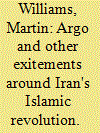

|
|
|
|
|
| Publication |
2014.
|
| Summary/Abstract |
Ben Affleck's film ARGO is a good film, but not all the details are accurate. This article is by Martin Williams, the British diplomat who, contrary to the picture painted in the film, personally escorted to safety the Americans who had escaped when the Iranian Revolutionary guards took over the US Embassy. He sets that episode in the broader context of his personal experience of working during a complicated period during which initially there were major commercial opportunities for British firms, and then the power of the Shah started to wane, and finally he was overthrown. The installation of a very different regime entirely changed the approach which diplomats needed to adopt in Tehran.
|
|
|
|
|
|
|
|
|
|
|
|
|
|
|
|
| 2 |
ID:
128026


|
|
|
|
|
| Publication |
2014.
|
| Summary/Abstract |
The Kashmir question is felt by many to be beyond resolution. As many again regard it as a situation wherein the status quo of on-going violence is now a 'conflict industry' with too much vested interest in play for any genuine avenues of negotiation to be pursued. The Kashmir Valley seems to have joined the long list of often forgotten Balkanised stories about unresolved hostilities written around the themes of geopolitics and jingoistic nationalism. The psychotherapist Justine Hardy looks at the question from another point of view, that of the psychological state of the people of Kashmir, the real stakeholders in any possible agreement between Pakistan and India over the disputed state of Jammu and Kashmir. She presents the case for adding another approach to those that appear to have stalled along the way.
|
|
|
|
|
|
|
|
|
|
|
|
|
|
|
|
| 3 |
ID:
128028
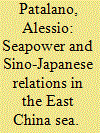

|
|
|
|
|
| Publication |
2014.
|
| Summary/Abstract |
The East China Sea (ECS) is gaining an increasingly central role in Sino-Japanese relations as it is crucial to the economic development and political affirmation of both countries, for whom the main sea routes crossing the ECS offer vital arteries for trade and energy imports. For the past year and a half, the ECS has attracted considerable international attention because of the flare-up of tensions over the sovereignty of the Japanese-controlled Senkaku Islands. This small group of islands is also claimed by the authorities in Beijing and known in Chinese as Diaoyu. Is war looming? Are we seeing an escalation spiral that will ultimately set the two countries on a collision course? The article argues that the current tensions should be seen in the wider context of the increased strategic significance of the ECS. For there are two different types of disputes here. One concerns sovereignty over the Senkaku/Diaoyu Islands; the other concerns the demarcation of the Chinese and Japanese maritime borders and exclusive economic zones (EEZ) as defined by the United Nation Convention on the Law of the Sea (UNCLOS). This distinction is important because sovereignty on land is different from sovereignty at sea. The former is connected to a vital national interest and historically, represented a primary reason for war. The latter focuses on functional rights over bodies of water included in the EEZ, not on the actual 'ownership' of the maritime realm. Accordingly, the article argues that seapower is going to play a crucial role in the projection of Japanese and Chinese power and status in the ECS and in the evolution of Sino-Japanese relations more generally. Significantly, Naval Defence doctrines in both countries have evolved greatly over recent years.
|
|
|
|
|
|
|
|
|
|
|
|
|
|
|
|
| 4 |
ID:
128029
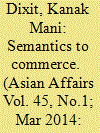

|
|
|
|
|
| Publication |
2014.
|
| Summary/Abstract |
With Partition and the rise of various different nationalisms there came the need to find a new name for what used to be called "British India". A framework for co-operation between the new countries was also needed. Initially regionalism was fashionable. But the regional organisation, SAARC, embodied cooperation between all the nation-states of the region, a veritable lowest common denominator rather than an additional layer of an inclusive regional identity for all the citizenry. The increasing use of "Southasia" is based on a recognition that even though India looms large, the region contains other countries with sizeable populations in a global context. But flesh must be put on the bones of the concept. The key is sub-regional commercial cooperation between viable units. There are many opportunities for cross-border economic activity, but what is needed is a porous border like the India/Nepal border, not a militarised border like the India /Pakistan border. Connectivity and bilateral free trade agreements will bring results and the Indian state of Punjab and the Pakistani province of Punjab are perhaps best placed to give an example of cooperation.
|
|
|
|
|
|
|
|
|
|
|
|
|
|
|
|
| 5 |
ID:
128034


|
|
|
|
|
| Publication |
2014.
|
| Summary/Abstract |
Nearly 46,000 people die from snakebite in India every year, so there is a real need for effective mitigating action. This depends on an understanding of snake behaviour in which the Irula excel. They are a traditional snake catching tribe and with the benefit of their knowledge it was possible to draw up a list of measures which could be taken to minimise contacts between snakes and humans.
|
|
|
|
|
|
|
|
|
|
|
|
|
|
|
|
| 6 |
ID:
128031


|
|
|
|
|
| Publication |
2014.
|
| Summary/Abstract |
One of the great founding legends of Soviet Union is that of the murder in September 1918 of 26 Soviet Commissars in Transcaspia, allegedly by a British officer, Reginald Teague-Jones. The episode which became the legend took place at the end of the First World War, at the very end of the eastern front, where the Russian withdrawal from the war left a vacuum and a situation which was confused, to say the least. Independent Soviets were springing up and one of these was the short-lived Baku Commune (also mythologised by the Soviets) When the Commune collapsed its leaders, the 26 Commissars, were imprisoned. Weeks later, in the confusion of the capture of Baku by the Turks, the Commissars escaped by boat, bound for Astrakhan, then held by the Bolsheviks. But they ended up in Krasnovodsk, in the hands of the anti-Bolsheviks and they were subsequently executed. Limited British forces (Malmiss and Dunforce) were in the area. They were initially deployed against the Turks, who were fighting on the German side, but then the Bolsheviks became the primary concern for the British. It is clear that Teague-Jones had a liaison role with the anti-Bolsheviks, but modern evidence suggests that it is very unlikely that he was even present at the execution of the 26 Commissars. The article shows how the legend grew and why the involvement of an agent of British Imperialism fitted a propaganda need.
|
|
|
|
|
|
|
|
|
|
|
|
|
|
|
|
| 7 |
ID:
128024
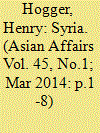

|
|
|
|
|
| Publication |
2014.
|
| Summary/Abstract |
From independence, Syria evolved somewhat differently from other Arab states. When Hafez al-Assad took over, internally he favoured a very Soviet-style centralisation of power and in the eyes of the West his foreign policy made Syria a "pariah" state. When his son Bashar succeeded him, there were hints of an open-ness to new political and economic thinking. European powers started to thicken up their relationship. The US/UK invasion of Iraq put an end to that. The Old Guard regained the ground they had lost. At least on the surface, the economic situation seemed manageable, though agricultural livelihoods were deteriorating sharply. Enter the Arab Spring. The regime's response was brutal and widely condemned, but in an international context very different from that of other threatened Arab regimes. Syria is a major Russian client and an ally of Iran. Nor were there easy choices for the West. The initially-moderate opposition splintered, with Islamist forces increasingly prominent. If there is a slender hope for the future it lies in building on the recent US/Russian diplomatic cooperation over the dismantling of the Syrian chemical weapons arsenal. The improved atmosphere in the talks over the Iran nuclear issue could also be a possible ray of sunlight. But the present situation is grim: casualties are mounting and the immense refugee problem needs more attention from the West.
|
|
|
|
|
|
|
|
|
|
|
|
|
|
|
|
| 8 |
ID:
128032
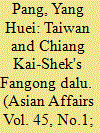

|
|
|
|
|
| Publication |
2014.
|
| Summary/Abstract |
For much of the 1950s, ROC President Chiang Kai-shek tried to formulate viable "counteroffensive" plans to reclaim mainland China. A main part of this vision was to attract US military sponsorship; for the ROC conspicuously lacked the military strength to reconquer mainland China. However, the formulation of these plans had unintended results for Taiwan. Firstly, the military plans gave Chiang's subordinates an indirect way of stating the impossibility of returning to mainland China, while strenuously proclaiming their loyalty. Secondly, Chiang Kai-shek's admonishment "????" Wu Wang Zai Ju (Forget Not the time at Ju), the clarion call for the ROC's mainland counter offensive, unwittingly promoted a more sedentary form of national identity for the average Taiwanese. Finally, the more Taiwan developed economically by means of US aid, the more the Taiwanese silently distanced themselves from Chiang's Quixotic dream of reclaiming mainland China. Thus, Chiang's leadership in "counteroffensive" planning did more to distance the island state from the mainland than "reclaim" it.
|
|
|
|
|
|
|
|
|
|
|
|
|
|
|
|
|
|
|
|
|